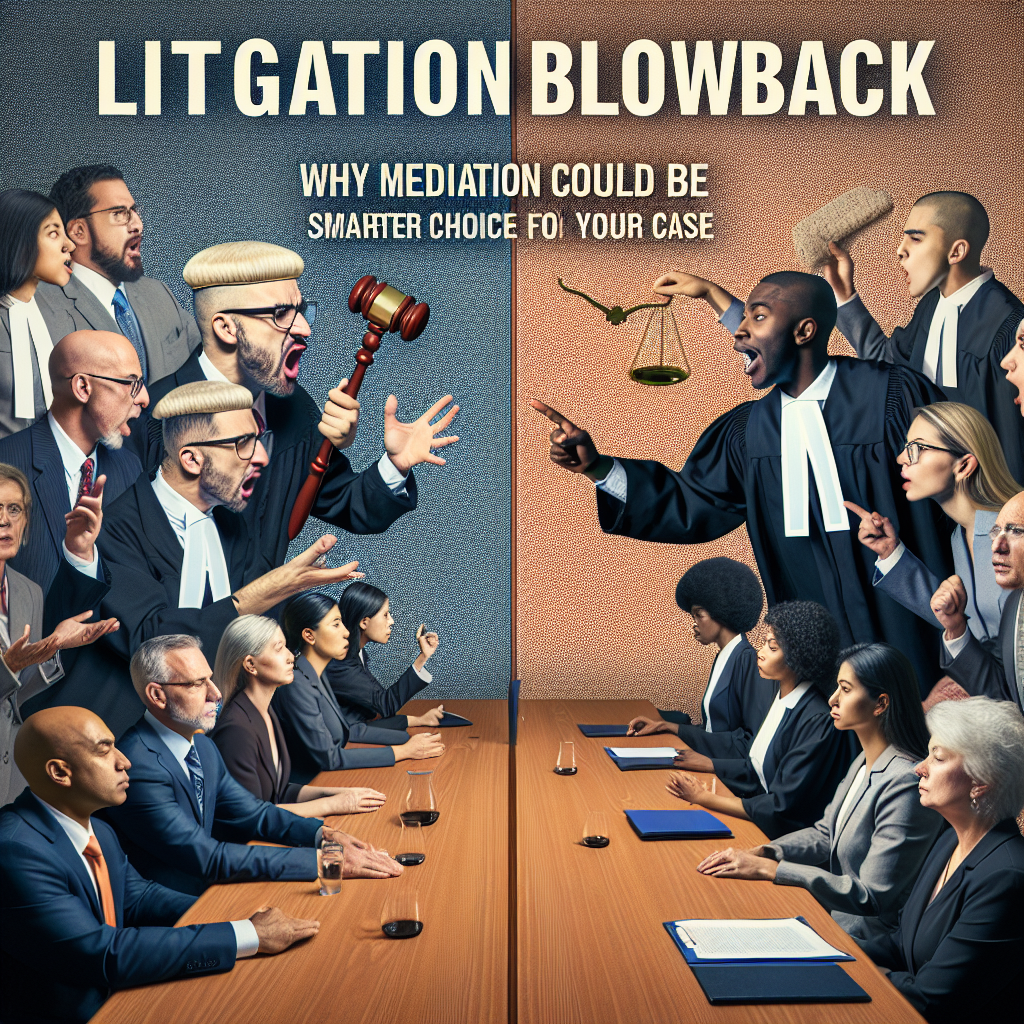In today’s fast-paced legal landscape, individuals and businesses often find themselves at a crossroads: pursue litigation or seek alternative dispute resolution methods like mediation. While litigation may seem like the more straightforward path, many are discovering that mediation not only saves time and money but also fosters amicable resolutions. In this article, we delve into the concept of litigation blowback and explore why mediation could be the smarter choice for your case.
Understanding Litigation Blowback
When we talk about litigation blowback, we refer to the unintended consequences that arise from engaging in a legal battle. While courtroom processes are designed to resolve disputes, the reality is that litigation can lead to a host of adverse outcomes:
-
Financial Drain: Legal fees can accumulate quickly, making even small cases financially burdensome. The costs associated with court filings, attorney fees, and expert witness fees can skyrocket.
-
Emotional Toll: The stress of a courtroom battle can take a heavyweight on your emotional health. The adversarial nature of litigation can lead to heightened tension and conflict.
-
Public Exposure: Court cases are typically public, meaning sensitive information can become accessible. This exposure can have lasting repercussions for personal and professional reputations.
- Time Consumption: The litigation process can extend over months, or even years. Delays in court schedules and extended discovery phases can lead to a prolonged period of uncertainty.
Are these drawbacks worth the perceived benefits that litigation offers? Understandably, many individuals lean towards the courtroom option due to its formal structure and the belief that a judge or jury will render a fair verdict. However, there’s often a superior alternative: mediation.
The Case for Mediation
A Cost-Effective Solution
One of the most compelling reasons to consider mediation is its cost-effectiveness. Mediation tends to be significantly less expensive than litigation because it typically requires fewer hours of legal work, resulting in reduced fees. Moreover, since mediation generally occurs over a shorter period, parties can resolve their disputes without the burden of mounting attorney bills.
Enhancing Communication and Relationships
Mediation provides a platform for open dialogue. Unlike courtroom scenarios, where parties are pitted against one another, mediation facilitates collaborative communication. Both parties work with a neutral mediator who assists in fostering understanding, empathy, and compromise. This collaborative approach can not only resolve the immediate issue but also help preserve relationships that might be crucial for future interactions—be it business partners, family members, or co-workers.
Greater Control Over Outcomes
In litigation, the decision is ultimately in the hands of the judge or jury. Mediation, on the other hand, allows you to have a say in the outcome. Parties can negotiate terms that are mutually satisfactory, tailoring solutions that litigation cannot guarantee. This ownership of the outcome often leads to greater satisfaction, even if the resolution isn’t a total ‘win.’
Confidentiality Protected
Mediation typically occurs in a private setting, allowing parties to speak freely without fear of their words becoming public record. This confidentiality means sensitive matters can be discussed openly without risking reputational damage. For businesses, this can be crucial in maintaining brand integrity.
Innovative Solutions
The rigidity of the court system often limits the types of resolutions that can be achieved. Mediation encourages creativity, enabling parties to form innovative solutions that may not be available in a litigation context. This flexibility can lead to outcomes that address the underlying needs of both parties, resulting in more meaningful settlements.
When Mediation May Not Be the Best Fit
While mediation is beneficial in many situations, it’s essential to recognize that it’s not a one-size-fits-all solution. In cases where power imbalances exist, such as domestic violence or severe disputes between corporations and employees, mediation may not yield the best results. In such instances, seeking legal remedies through litigation may be necessary to ensure justice and protect the vulnerable parties involved.
Conclusion: Make the Informed Choice
Ultimately, understanding the potential for litigation blowback is crucial for anyone facing a legal dispute. While the courtroom may beckon as a traditional solution, consider the many benefits that mediation offers. By opting for this alternative dispute resolution method, you can save time, reduce costs, and even preserve relationships.
As you navigate your legal journey, take the time to weigh your options. Speak with legal counsel about the possibility of mediation and gauge whether it aligns with your goals. In many cases, choosing mediation can be a smarter, more human-centered decision that leads to a resolution you can feel good about.
Resources for Mediation
For those considering mediation, many organizations offer resources to help you find a qualified mediator. Research local mediation services, inquire about fees, and read reviews to ensure you’re selecting the right professional for your case. With the right approach, you may find a smoother path towards resolution and peace of mind.


